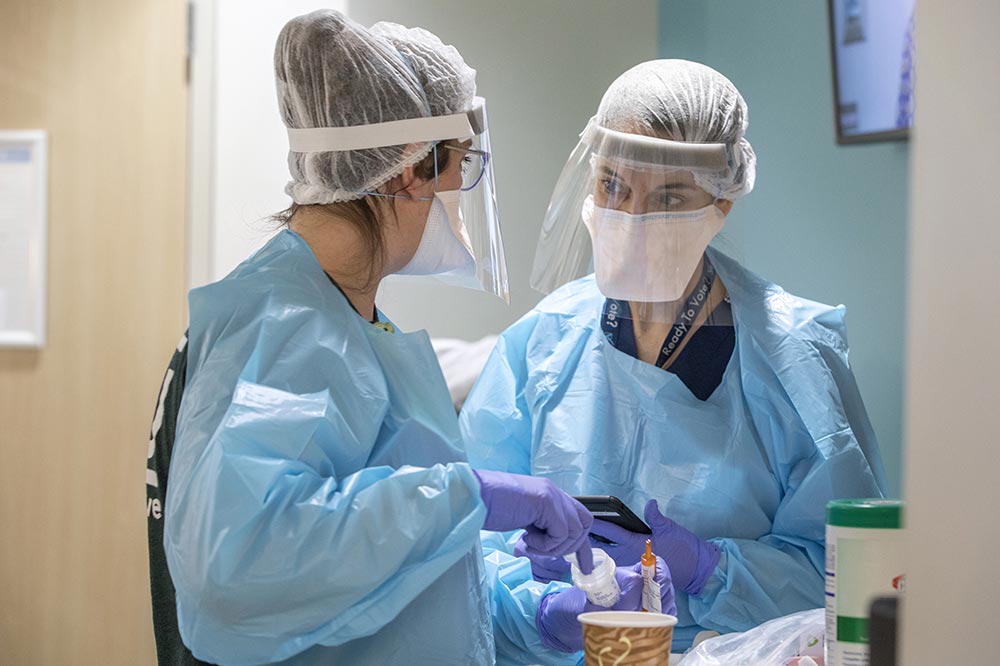Nationwide Study on Pfizer COVID-19 Vaccine Effectiveness for Ages 12 to 18 – “The Vaccine Works for Children!”
0 View
Share this Video
- Publish Date:
- 11 December, 2021
- Category:
- Covid
- Video License
- Standard License
- Imported From:
- Youtube
Tags

dr. Elizabeth Mack, left, and pediatric intensive care nurse Alexandra Rosol care for an unvaccinated patient at the PICU. Credit: MUSC
A team of researchers from MUSC Shawn Jenkins Children’s Hospital contributed to a nationwide study of the effectiveness of Pfizer-BioNTech’s COVID-19 vaccine against hospitalization in children ages 12-18. The study was conducted by 19 hospitals in 16 states. The results of the study, published in the Centers for Disease Control and Prevention’s Morbidity and Mortality Weekly Report, show that the vaccine is effective against hospitalization in that population.
“People assume that children have a much milder course of COVID-19. But the Delta variant is different,” says Elizabeth Mack, MD, pediatric intensive care physician and principal investigator for the MUSC study site.
“The [study] results showed that the [Pfizer-BioNTech] vaccine was extremely effective, and that some of the hospitalized COVID-19 patients who were not protected with the vaccine had quite severe courses.” — Dr. Elizabeth Mack
Mack explained that 100% of the pediatric COVID-19 patients admitted to MUSC Shawn Jenkins Children’s Hospital since the start of the pandemic are unvaccinated.
Mack also emphasized that children infected with the Delta variant were more likely to have a disease similar to the adult phenotype. In other words, all of their organs are at risk for damage, not just the lungs. Children in the South were at particularly high risk due to low vaccination coverage and a host of co-morbidities, including obesity and asthma.
“We’ve seen children with COVID-19 in the ICU with terrible respiratory failure, kidney failure, liver failure, cardiovascular failure, and unfortunately we’ve also seen deaths,” Mack said.
The nationwide study included 464 hospitalized children ages 12-18. Some of these children were hospitalized because of COVID-19. Other children in the study were enrolled as hospitalized controls with syndromes similar to COVID-19, such as pneumonia, or with syndromes unrelated to COVID-19, such as a broken leg. Vaccination and exposure history were then studied for COVID-19 patients and control patients. MUSC Shawn Jenkins Children’s Hospital continues to add hospitalized COVID-19 patients to the study.
PICU nurse Alexandra Rosol, left, and Dr. Elizabeth Mack, right, discussing a patient. Credit: MUSC
“The purpose of this study was to look at the effectiveness of the Pfizer-BioNTech vaccine in children aged 12 to 18 years after two injections,” Mack said. “The results showed that the vaccine was extremely effective and that some of the hospitalized COVID-19 patients who were not protected with the vaccine had quite severe courses.”
Mack also explained that there was a high rate of myocardial inflammation due to either COVID-19 or multisystem inflammatory syndrome in children, as opposed to the very low risk of myocarditis related to the vaccine.
“We only had one or two cases of myocardial inflammation due to the vaccine, and those patients had normal heart function and only needed ibuprofen. They were discharged home within a day or two,” Mack explained.
In South Carolina, 66% of children ages 12-19 have not yet been vaccinated.
“In the ICU we see many parents wishing their children were vaccinated. Those kids have multi-system organ failure, months in ICU, lots of procedures, financial devastation and loss of school time.” — Dr. Elizabeth Mack
“The low vaccination coverage in the pediatric population at the moment is probably not primarily related to access to vaccines,” Mack said, explaining that some parents are hesitant to get their children vaccinated. “Fertility and puberty are the main concerns of parents, but fortunately the data supports vaccination of adolescents and women without negatively impacting these problems.”
Mack explained that studies on the vaccine’s long-term effects are ongoing. However, the long-term effects of COVID-19 are already devastating. Some children needed intensive rehabilitation, others had to have a tracheostomy and still others had permanent kidney or heart disease.
“In the ICU, we see a lot of parents wishing their children were vaccinated,” Mack says. “Those kids have multisystem organ failure, months in ICU, lots of procedures, financial devastation and loss of school time.”
The study found that the Pfizer-BioNtech vaccine was effective against hospitalization in patients aged 12-18, during the period when the Delta variant was predominant.
“COVID-19 and its effects are all ‘vaccine preventable’,” Mack emphasized. “The vaccine works for children!”
Reference: “Effectiveness of Pfizer-BioNTech mRNA Vaccination Against COVID-19 Hospitalization in Individuals 12-18 Years of Age – United States, June-September 2021” by Samantha M. Olson, MPH; Margaret M. Newhams, MPH; Natasha B. Halasa, MD; Ashley M. Price, MPH; Julie A. Boom, MD; Leila C. Sahni, PhD; Katherine Irby, MD; Tracie C. Walker, MD; Stephanie P. Schwartz, MD; Pia S. Pannaraj, MD; Aline B. Maddux, MD; Tamara T. Bradford, MD; Ryan A. Nofziger, MD; Benjamin J. Boutselis; Melissa L. Cullimore, MD; Elizabeth H Mack, MD; Jennifer E. Schuster, MD; Shira J. Gertz, MD; Natalie Z. Cvijanovich, MD; Michele Kong, MD; Melissa A. Cameron, MD; Mary A. State, MD; Emily R. Levy, MD; Brandon M. Chatani, MD; Kathleen Chiotos, MD; Laura D. Zambrano, PhD; Angela P Campbell, MD; Manish M. Patel, MD; Adrienne G. Randolph, MD and Overcoming COVID-19 Researchers, Oct. 19, 2021, Morbidity and Mortality Weekly Report.
DOI: 10.15585/mmwr.mm7042e1










